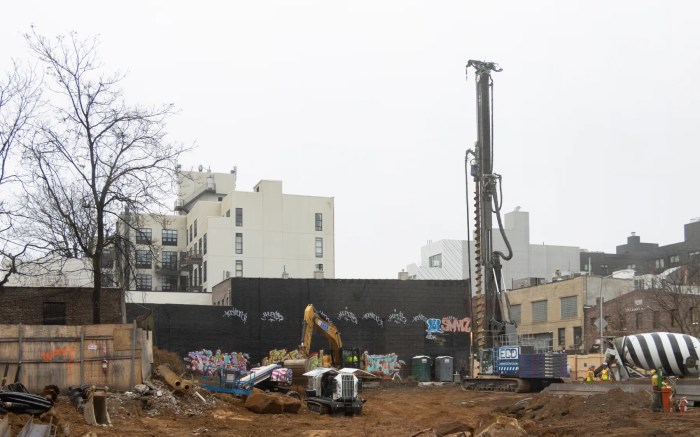Herds of nerds, trivia buffs, brainiacs and wannabe wealthy folks are visiting ABC-TV on the Upper West Side this month to audition for the 14th syndicated season of “Who Wants to Be a Millionaire,” the iconic game show that put “lifeline” and “final answer” into the popular vernacular.
Their plans for the jackpot are naturally tailored to life in one of the nation’s costliest and most complicated metropolitan areas.
Kips Bay renter Abe Seeman, 58, doesn’t plan on buying in NYC should he win because “a decent one-bedroom is at least a million and a half,” dollars in Manhattan, he explained. Should he win, the sales consultant said he’d “rent a castle in Ireland,” to give his new wife of Irish descent a taste of her origins, pay off IRS and credit card debt and reward an adult son.
Seeman is a game show veteran — he won $1,300 on a show called “Cash Cab” and had previously auditioned for WWTBAM, but didn’t get selected as a contestant.
He was typical of many aspiring competitors in that he is a trivia buff (“I hosted my own trivia night!”), and claimed chops on American history but weakness in the category of geography — a subject in which Americans are notoriously illiterate.
Since “Who Wants To Be A Millionaire” began syndication in 2002, contestants have won nearly $95 million. Thirteen contestants strolled off with the nail-biting million dollar prize, since the franchise began in 1999, though the last contestant to go all the way and actually win a million simoleons was bartender Sam Murray in 2009.
Most of the people auditioning expressed mundane wishes to travel more, work less, help family, endow charities and buy property. Rudy Coombs, 62, of Mt. Vernon, stood out for his wish to keep young men out of prison.
“I have a lot of young kids who could really use some of this money!” he exclaimed. Coombs is the vice-president of The Youth Shelter Program of Westchester, an alternative-to-incarceration program for young people facing criminal charges, and hoped to win in order to expand his program.
“We have only 12 beds,” with at least 2,000 young men vying to stay in them, he explained. “I’m good … I have a nice little pension,” said Coombs, but he was almost feverish in his desire to help disconnected youth. When he was young, he explained, “somebody helped me: Now I feel obligated.”
Applicants such as Seeman and Coombs are winnowed by filling out applications and taking a timed (10-minutes) top-secret 30-question multiple-choice test. “I can’t confirm or deny” whether different tests are administered on different days, much less reveal what qualifies as a “passing” grade, said supervising producer Liz Harris.
But lots of people know or can guess what nation has the most vending machines per capita or the era in which dinosaurs roamed the earth: Who was she likely to cast?
“We’re looking for people who are really excited to be on the show — people that viewers can relate to,” with an eye to picking a diverse group of contestants, Harris said.
Many of the aspirants were over age 40. They said WWTBAM was one of the few shows that appeared to reward their wisdom and life experience. (Also, response time tends to slow with age and shows such as “Jeopardy,” place a premium on response speed as opposed to the slow and careful thinking rewarded on WWTBAM.)
Harris insisted that despite Hollywood’s youth obsession, older contestants had a fair shot: “In fact, if it’s their life dream to be on the show, I think that’s AMAZING.” WWTBAM will have “bucket list” shows for older contestants this season as well as “specialty weeks” in which the show specifically solicits whiz kids, college freshman, members of the military and their families and bachelors. Some episodes are devoted to specific areas of interest, such as movies.
Part of the show’s appeal lies in its bizarre meritocracy: “We have a lot of doctors and lawyers, but I don’t see them do any better than the waiters and teachers,” said Harris. The likeliest contestants “just love knowledge … “A lot of the people do this thing called ‘Wiki Walking’ — they’re on (Wikipedia) for hours going from one article to another.”
NYC’s pool of aspirants is noteworthy in that we are more driven and competitive than people elsewhere, said Harris. Too, more applicants here are likely to be stay-at-home moms, “in between jobs, looking for work, or unemployed, ”she added.
Seeman aced his multiple choice test and hoped he had charmed producers. He was hoping to receive an email notifying him that he made it into the contestant pool.
Coombs discovered he flubbed the written test: There would be no interview with a producer, no million dollars for his beloved Youth Shelter Program. But mindful that perseverance is the key to triumph, and wanting to set a good example for the kids he helps, he vowed to return. “I’ll try tomorrow!” Coombs exclaimed. “You can’t give up on yourself!”
Who Wants To Be a Millionaire is holding auditions in NYC on selected dates through May 28. Details: millionairetv.dadt.com/auditions



































